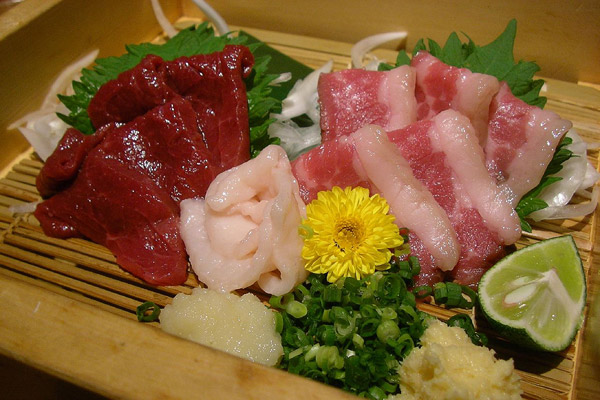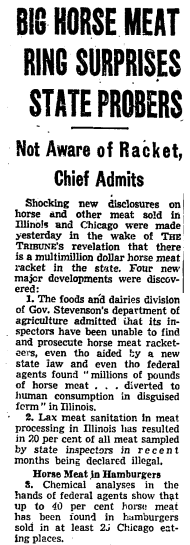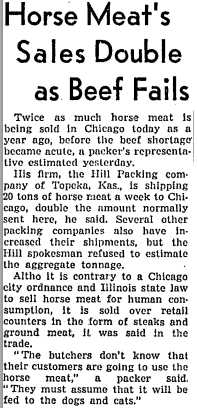
Horse meat sashimi
Ireland and Poland are locked in an international incident. The intrigue? Horse meat. Ireland says Polish distributors shipped meat that "showed up to 20 percent horse DNA content relative to beef, confirming the raw material from Poland to be the source of equine DNA content in certain burgers." Poland says neigh. Burger King, well….

It's entirely possible; it's an old trick, reminding me of one of Chicago's lesser-known but (at the time, at least) most damaging scandals. Chicagoans woke up on January 10, 1952 to find that their hamburgers were horseburgers:

Horse meat is fine. It's probably healthier than the beef it was replacing. Up until Rod Blagojevich banned the practice in 2007, Illinois slaughtered horses and exported the meat, the last state to do so. But Americans (and a lot of people in the West) have a thing about not eating it. It probably has less to do with horses being cute or pretty or smart, at least originally, than the Church declaring that horsemeat is pagan:
Food avoidances and taboos have historically been based on religion, or have functioned to demonstrate social status differences between individuals and social groupings (18). Although Leviticus is silent on the specific issue of horse (19), in 723, Pope Gregory III indicated that the eating of horses was a ‘filthy and abominable custom’ in his instructions to Boniface, Bishop to the Germans (20). In Ireland, the Canones hibernenses, which date from the 7th century, impose an unusually harsh penance of 4 y on bread and water for the consumption of horsemeat (20). The explanation of this nonbiblically based Canon Law is that the consumption of horsemeat was associated with pre-Christian Celtic and Teutonic religious sacrifice (20,21). The church condemnation of horsemeat consumption was directed to suppressing pagan practices and distinguishing the Christian from the heathen (20,21).
Over the years, this evolved into a general aversion to horse meat… unless, of course, it was 1945 and not-horse meat of all kinds was running low, and people were buying horse meat to "feed to their dogs and cats."

Seven years later, the Tribune broke the news of a massive state horse-meat racket. And it dominated the news for the next year. It pulled in the governor, Adlai Stevenson, who was accused of knowing about the scandal months before it broke (and who got the nickname "Horse Meat Adlai" from the Tribune editorial page); it led to multiple indictments and mass firings; and it was reported that it cost Syndicate head Tony Riccardo his job, though that doesn't square with the historical record. The whole operation was run by the mafia—the horse meat racket was linked to the bombing ofa Peter Pan restaurant at North and Harlem—who brought in a lot of money:
Boyle said his investigators have learned that the illicit horse meat dealers set aside a slush fund of 3 cents a pound sold in the Chicago area, this fund would have amounted to $750,000 for payments of bribes. (Chicago Tribune, 2/28/52)
The superintendent of foods and dairies for the state admitted to taking "more than $3,000 in bribes"; that's about $26,000 in 2012 dollars. $750k translates to about $6.5 million dollars today for bribes alone. The arbitrage of cultural taboos is a rich vein, especially when cattle prices are going up 20 percent a year (PDF). And 4.5 million pounds of horse, sold at 45 cents less than the price per pound of beef, adds up to over two million dollars, or $17 million today.
But it wasn't all bad news, from a certain perspective: hamburgers were likely leaner and higher in iron in Chicago for a couple years—until the news broke, and then hamburger sales instantly dropped 50 percent.
Photograph: jetalone (CC by 2.0)


